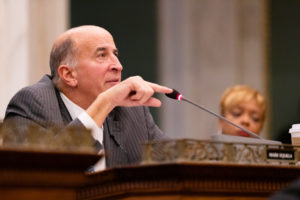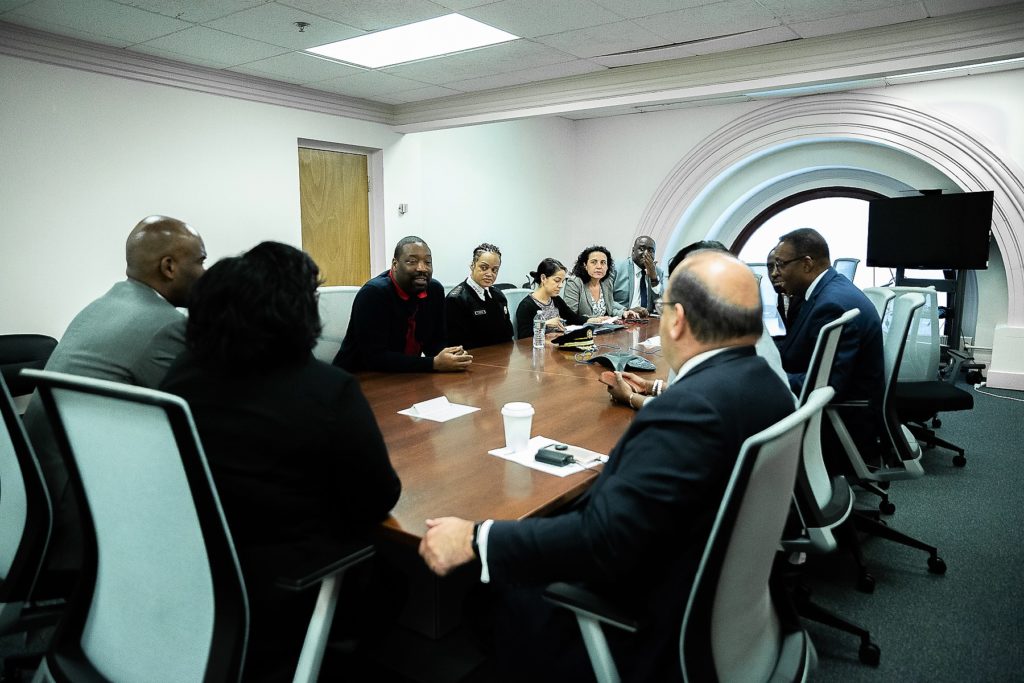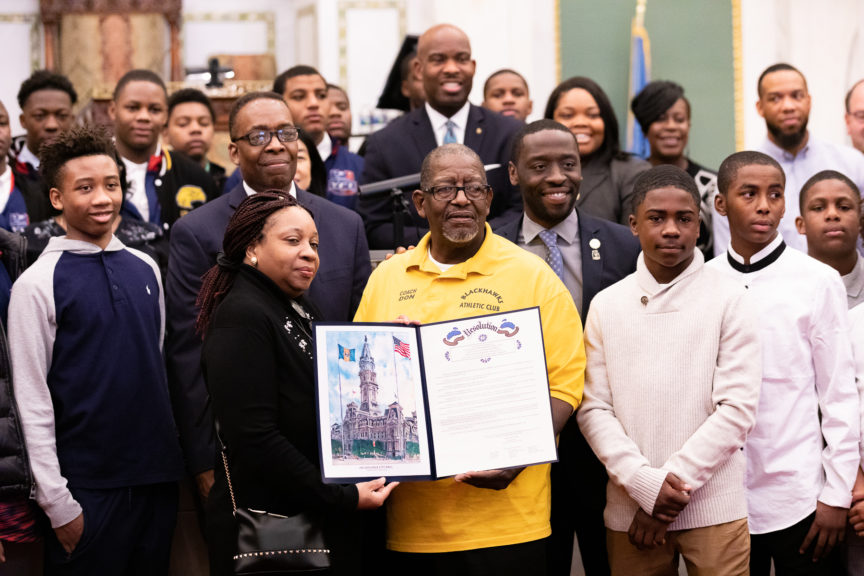 A Furor in City Council over Plans for Safe Injection Site in South Philadelphia
A Furor in City Council over Plans for Safe Injection Site in South Philadelphia
For the past several years, as overdose deaths from Philadelphia’s opioid epidemic have mounted, a non-profit group Safehouse has advocated to open a “safe injection site,” where individuals suffering from drug addiction could legally inject narcotics under the supervision of medical personnel.
For months, the conversation around a safe injection site centered on Kensington, the epicenter for Philadelphia’s heroin and opioid epidemic that has seen more than 1000 people die from overdoses each year.
Suddenly, on Wednesday, the debate over safe injection sites pivoted, as officials with Safehouse announced plans to open an injection site – the first legally sanctioned site in the United States – in a medical plaza on Broad Street in the heart of South Philadelphia. They said they would open next week.
This produced a firestorm of public and political protest – neighborhood activists and a Councilmember interrupted a Safehouse press conference to criticize how the public was left in the dark over the announcement. And it led City Council as a body to rise up on Thursday to urge the non-profit group – and the Kenney administration, which supports the site – to slow down and reconsider.
“If you’re going to support it,” said Councilmember Maria Quiñones Sánchez (7th District), whose Kensington district has also been targeted for a safe injection site, “then the City needs to lead it, own it, and accept responsibility for it.’ Quiñones Sánchez was directing her remarks at the Kenney administration, which has consistently said it supports the idea of safe injection sites as one strategy to reduce drug overdose deaths in Philadelphia and to get more people into treatment.
Councilmember after Councilmember took the floor to oppose the plan for a safe injection site on South Broad Street, either for the lack of public input or briefing of Council members, or on broader policy grounds.
“I have grave concerns about whether a facility where people can inject narcotics will lead those individuals into treatment and recovery,” said Council President Darrell L. Clarke (5th District), in his first public comments on the topic. “Therefore, I cannot support safe injection sites in Philadelphia.”
“This process has not been transparent,” said Councilmember Kenyatta Johnson, whose 2nd District included the safe injection site location. “My office has received hundreds of phone calls, but there’s been zero community input. The community deserves to have its voice at the table.”
 Councilmember David Oh (At Large) introduced legislation that would require that 90 percent of impacted community members and businesses must approve before a safe injection site could be opened. Councilmember Mark Squilla, whose 1st District starts across Broad Street from the site, said plaintively, “We all want to save lives, but the way they went about this is just wrong.”
Councilmember David Oh (At Large) introduced legislation that would require that 90 percent of impacted community members and businesses must approve before a safe injection site could be opened. Councilmember Mark Squilla, whose 1st District starts across Broad Street from the site, said plaintively, “We all want to save lives, but the way they went about this is just wrong.”
By nightfall, it appears that the non-profit group Safehouse; the building’s owner; and Mayor Kenney had heard the public outcry. First, Safehouse announced it would postpone opening the site until it had an opportunity to brief the community – a reversal from its earlier position. Next, the building’s owner communicated to the city he was no longer interested in moving forward with a lease for the site. That led the mayor to issue a statement last night:
“In light of this development and the strong concerns voiced over the past two days, it’s clear that no site will open imminently,” Mayor Kenney said. “I am glad that this will allow Safehouse more time to examine its options, and to engage the community. It will allow those with concerns more time to get answers. And it will allow everyone to take a deep breath and focus on the ultimate goal of this effort: to save the lives of fellow Philadelphians who are struggling with addiction. I remain convinced that overdose prevention sites do save lives — as they have in more than 100 cities around the world. I remain committed to moving forward in a deliberate, thoughtful, and collaborative way to open a site that will save lives.”
A Wage Tax Cut for Low-Income Philadelphia Workers is Heading to the Mayor’s Desk
A bill by Councilmember Allan Domb (At Large) to provide a wage tax cut for low-income Philadelphia workers was passed unanimously by Council on Thursday and is headed to the mayor’s desk, where its’ prospects remain unclear.
When Councilmember Domb moved this legislation through Council late last session, Mayor Kenney exercised a rare pocket veto to prevent the bill from becoming law, as Council’s session expired in December. At its first session last month, Domb re-introduced the bill, and it easily passed Council on Thursday.
Domb believes the “poorest big city in America” should not be taxing its lowest-income workers, and his bill would return an estimated $43 million a year to 60,000 working families in Philadelphia, or an estimated $800 a year.
The Kenney administration takes the position that any wage tax reduction legislation should be negotiated during the upcoming city budget process. The mayor will deliver his budget address on Thursday, March 5th to City Council.
Domb’s wage-tax relief bill now goes to the mayor’s desk for his consideration.
Other Action in Council This Week …
Aside from its public Meeting and many committee hearings on bills and resolutions, City Council also holds briefings for members and staff frequently when Council is in session. This week, Council held three gatherings worth noting.
On Tuesday, Council’s Women’s Caucus hosted a staff briefing on reproductive justice at City Hall. Organized by Councilmember Helen Gym (At Large) and cosponsored by members Bass, Brooks, Gauthier, Gilmore Richardson, Parker and Quiñones Sánchez, the briefing brought eight organizations working in the fields of women’s health, reproductive law and health equity to the table to discuss issues facing Philadelphia’s communities. Topics included eradicating black maternal mortality, supporting medically-accurate sex education, and accessing the need for additional training for public health employees.
Hosting a briefing on reproductive freedom and justice with all the women of @PHLCouncil.
Glad to be in a room full of advocates organizing communities to advance the health and well-being of people most impacted by systemic oppression. #ReproductiveJustice pic.twitter.com/cSfTS1op3m
— Helen Gym (@HelenGymAtLarge) February 25, 2020
On Wednesday, councilmembers and staff joined freshman Councilmember Isaiah Thomas (At Large) as he celebrated African-American owned businesses that participated in his #BlackBusinessCrawl during February’s Black History Month. Thomas used social media creatively all month as he and his team fanned out across the city, visiting African-American owned businesses to highlight their stories, encourage people to shop and patronize their stores, and highlight the importance of neighborhood economic development.
Thank you to all who attended our #BlackBusinessCrawl Luncheon, today!
We wanted to use #BHM to highlight Black-owned businesses throughout the City and it was an absolute honor to visit and highlight these fantastic entrepreneurs. Thank you. pic.twitter.com/Aq7UoJX7v2
— Council Member Isaiah Thomas (@CMThomasPHL) February 26, 2020
Also this week, Council held an informal meeting with the new Philadelphia Police Commissioner Danielle Outlaw, to get to know the city’s new top cop, and to listen to some of her initial thoughts about public safety, crime and violence in Philadelphia. This was Outlaw’s second official visit to Council. As a reminder, the Commissioner testified at a hearing of the Special Committee on Gun Violence last week. 
Inside the Rail …
The next Stated Meeting of City Council will take place on Thursday, March 5th, at 10 a.m. in Council’s chamber on the 4th floor at City Hall.
Next Thursday’s Meeting will also include Mayor Kenney’s Annual Budget address to Council, as the mayor introduces his proposed Fiscal Year 2020-2021 budget for Philadelphia.
# # #


